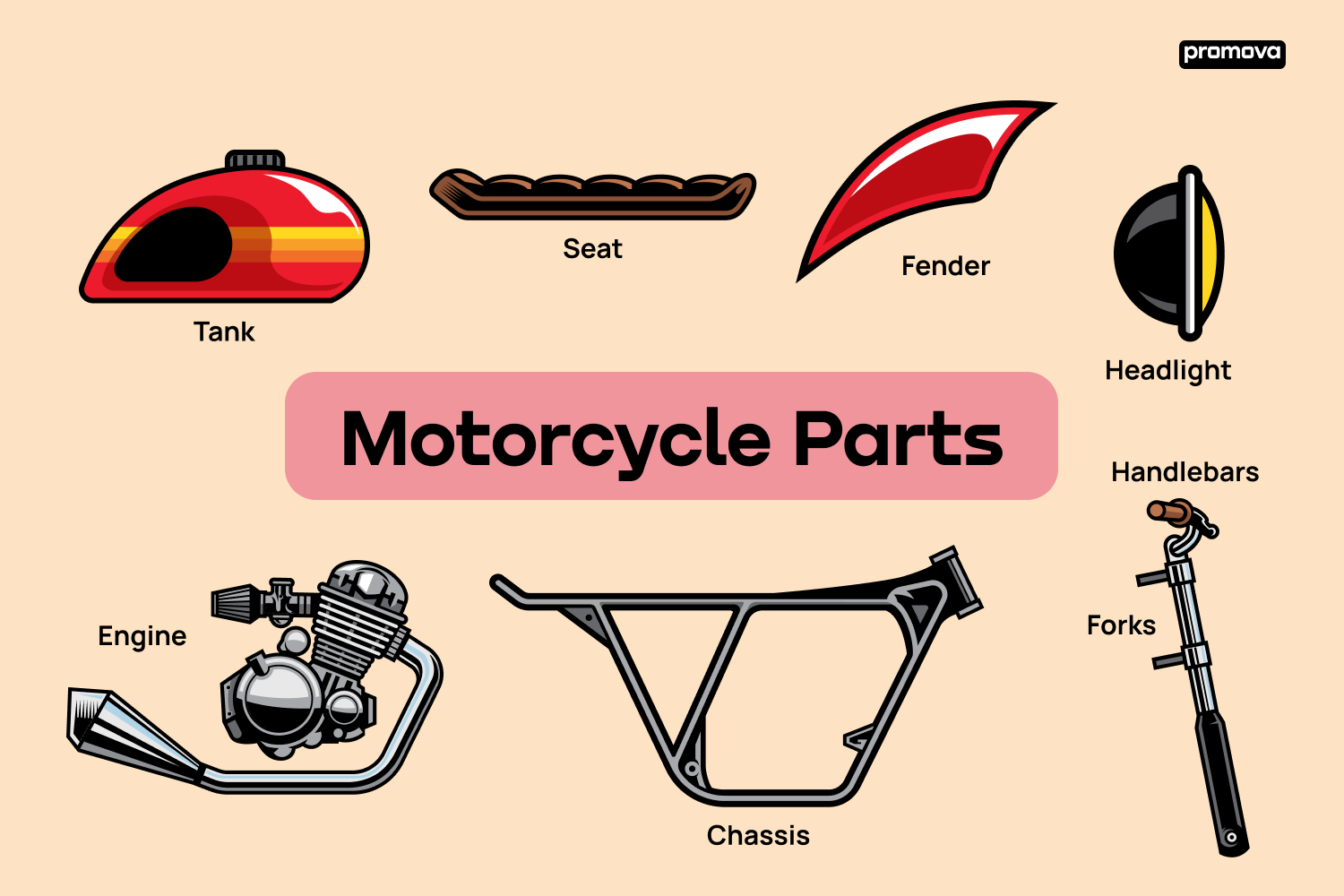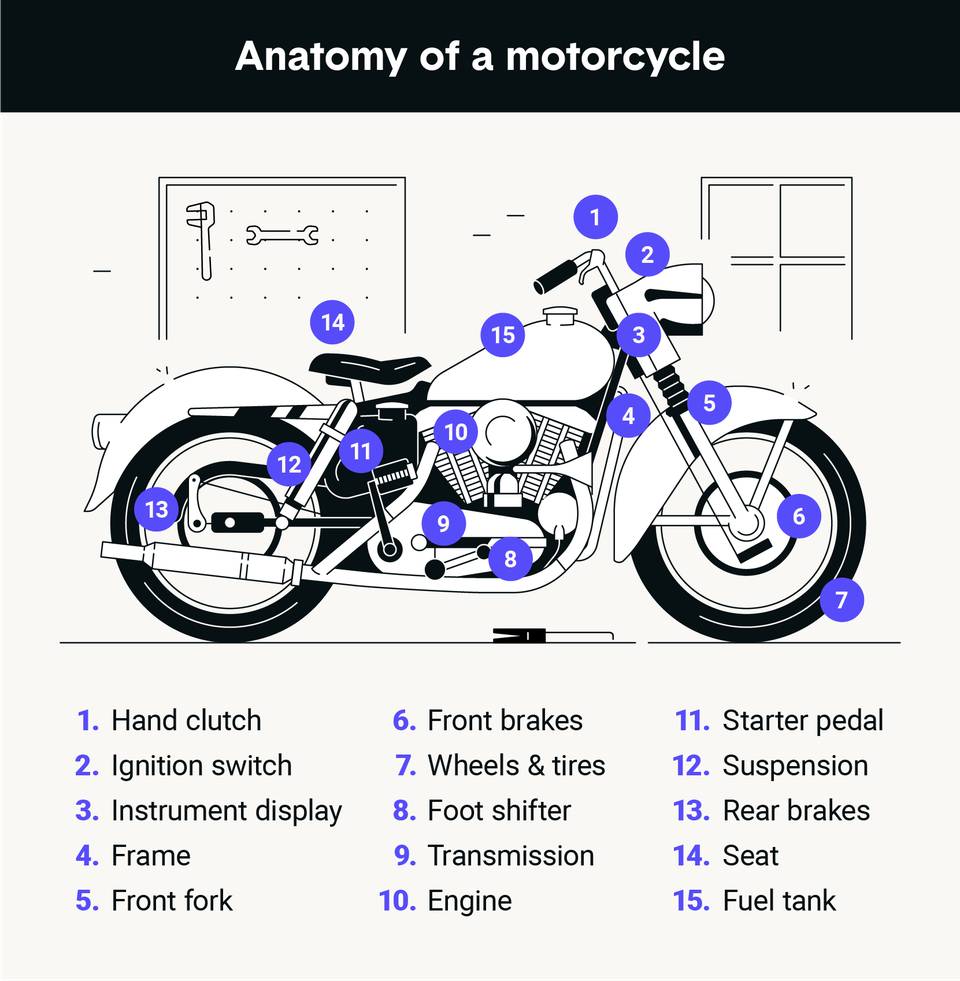Discover the Important MotorBike Components You Required for Optimum Performance
Recognizing the crucial parts of a motorbike is fundamental for accomplishing peak efficiency. Each component, from the engine to the braking system, plays a crucial function in general capability and safety. Routine maintenance can stop unexpected failings and boost the riding experience. However, numerous cyclists overlook the complexities of these systems. Discovering how they interact can bring about a more efficient experience. What crucial elements should every biker prioritize?
The Engine: The Heart of Your Motorcycle
The engine offers as the core component of a motorcycle, driving its efficiency and specifying its capacities. It is accountable for transforming gas into mechanical energy, which powers the bike onward. Various kinds of engines are used, including single-cylinder, V-twin, and inline configurations, each offering distinct qualities fit for different riding purposes and styles. The engine dimension, commonly gauged in cubic centimeters (cc), considerably influences efficiency, with bigger engines normally supplying more power and torque.Furthermore, the engine's design and technology, such as fuel shot systems or air-cooling versus liquid-cooling, impact performance and dependability. Upkeep is vital for peak operation; factors like regular oil adjustments and checking stimulate connects guarantee long life. Cyclists often take into consideration an engine's responsiveness and level of smoothness, as these characteristics improve the overall riding experience. Inevitably, the engine stays an important aspect that defines not just the bike's performance but also the biker's link to the device.
The Transmission: Shifting Gears Efficiently
The transmission plays a crucial function in a motorcycle's efficiency, particularly in the technicians of gear moving. Understanding just how to shift equipments efficiently can improve the overall riding experience, while routine upkeep assurances peak capability. Appropriate attention to these elements can greatly affect the long life and effectiveness of the bike.

Gear Shifting Mechanics
Smooth equipment shifting is vital for ideal motorcycle performance, greatly affecting both velocity and control. The auto mechanics of equipment shifting include the communication in between the clutch, gear bar, and transmission system. When a cyclist engages the clutch, it disengages the engine from the transmission, enabling a gear modification without harming the elements. A well-timed launch of the clutch, combined with precise motion of the gear lever, promotes a smooth change between gears. This process ensures that the engine runs within its ideal power band, enhancing efficiency. Motorbike Components NZ. In addition, understanding the gear proportions and their effect on speed and torque can aid bikers make notified options during changes, eventually adding to an extra receptive and delightful riding experience
Maintenance Tips Significance
Regular upkeep plays an important function in ensuring that the transmission system operates efficiently, enabling for smooth gear shifts. Consistently checking and changing the transmission liquid is essential, as old liquid can cause enhanced rubbing and wear. Furthermore, checking the clutch for wear guarantees peak engagement and disengagement, preventing slippage throughout equipment modifications. Lubrication of moving components is similarly crucial to minimize friction and boost performance. Motorcycle proprietors must additionally check for leakages and unusual sounds, as these can indicate underlying issues. By sticking to these upkeep tips, riders can lengthen the life expectancy of their transmission system, ensuring that gear changes stay smooth and contributing to the overall efficiency of their motorbike.
The Braking System: Ensuring Safety on Every Adventure
Braking systems are essential components that directly influence a motorbike's safety and efficiency. They are composed of various components, consisting of brake pads, rotors, calipers, and hydraulic lines, all functioning together to assure efficient deceleration. The sort of braking system-- typically either disc or drum-- influences responsiveness and stopping power.Regular upkeep is vital to promote peak efficiency; used brake pads can result in decreased performance and enhanced quiting distances. Furthermore, the top quality of brake liquid need to be kept an eye on, as it can take in moisture in time, compromising stopping efficiency.Riders should likewise consider the relevance of anti-lock braking systems (ABDOMINAL), which prevent wheel lockup during abrupt quits, boosting total safety and security. Appropriately working brakes are not practically stopping; they impart self-confidence in the motorcyclist, permitting for more secure navigation through different surfaces. Inevitably, a reputable braking system is vital for enjoying every adventure with satisfaction.
The Suspension: Enhancing Comfort and Control
A well-functioning suspension system significantly adds to a motorbike's general performance, matching the effectiveness of the braking system. The suspension plays a considerable function in absorbing shocks from irregular surface areas, guaranteeing a smoother ride while keeping tire contact with the road. This call is important for both security and control, permitting riders to browse edges with confidence and precision.Different kinds of shock absorber, such as telescopic forks or mono-shocks, use varying degrees of convenience and handling. Correctly tuned suspension enhances responsiveness, providing the rider with an extra connected feeling to the motorcycle. Regular upkeep checks are vital to ascertain the suspension parts, including dampers and springs, are functioning at their ideal. An efficient suspension system not only boosts the riding experience but additionally contributes to the longevity of various other motorbike components by decreasing deterioration. As a result, buying high quality suspension is vital for any kind of major motorbike fanatic.
The Tires: Linking You to the Roadway
Tires play a vital duty in a motorbike's efficiency, serving as the key link in between the biker and the roadway. Comprehending the various sorts of tires offered can considerably impact managing and safety and security. Furthermore, regular maintenance is vital to ensure peak tire efficiency and longevity.
Tire Keys In Explained
Just how Our site do different tire kinds affect a motorcycle's performance? Tire types play a crucial role in establishing a motorbike's handling, grip, and security. Sport tires, created for high efficiency, deal improved grip and responsiveness on smooth roadways, making them perfect for competing and aggressive riding. Alternatively, touring tires focus on sturdiness and convenience, supplying a smoother adventure for long-distance traveling. Off-road tires, identified by their rugged step patterns, stand out in traction on unpaved surfaces, suitable for journey enthusiasts. Additionally, dual-sport tires blend characteristics from both off-road and on-road groups, providing to versatile riding demands. Inevitably, selecting the right tire type is necessary for maximizing efficiency, making sure security, and improving the general riding experience.
Maintenance Tips Offered
While riding when driving, keeping optimal tire condition is important for security and performance. Frequently checking tire pressure is crucial, as under-inflated tires can cause bad handling and enhanced wear. It is a good idea to check tread deepness regularly; used tires compromise grasp and stability. Furthermore, cyclists must search for signs of damage, such as splits or bulges, which can suggest the need for substitute. Turning tires regularly guarantees also wear, enhancing longevity. Keeping tires tidy from debris and preventing too much visuals can click here now extend their life-span. Maintaining appropriate placement and balance contributes to come to a head efficiency, reducing tension on various other bike components. Complying with these upkeep pointers will considerably boost the overall riding experience.
The Fuel System: Sustaining Efficiency and Efficiency
The fuel system plays an important function in maximizing a motorcycle's efficiency and effectiveness, as it guarantees the optimal shipment of fuel to the engine. It makes up numerous critical elements, including the fuel storage tank, gas pump, fuel filter, and gas injectors or carburetor. Each component needs to operate successfully to guarantee a smooth and powerful ride.The fuel container stores gasoline and supplies it to the engine using the fuel pump, which generates the necessary pressure. A gas filter avoids impurities from getting in the engine, while the injectors or carburetor mix gas with air for combustion.Proper upkeep of the gas system is crucial; a blocked filter or malfunctioning injector can bring about decreased performance and raised gas intake. By confirming that the gas system runs effectively, cyclists can appreciate enhanced throttle reaction, much better fuel economic situation, and in general improved riding experience.
The Electric System: Powering Your Ride
An efficient electrical system is vital for the general functionality and safety of a motorcycle, as it powers essential parts such as the ignition, illumination, and numerous digital systems. This system consists of the battery, which stores power, and the generator, in charge of creating power while the engine runs. The electrical wiring harness attaches these components, guaranteeing dependable power distribution.Additionally, fuses secure the system from overloads, while relays aid control high-current tools with low-power signals. A properly maintained electric system improves performance by making sure smooth beginnings and regular operation of lights and signals, essential for rider exposure and safety.Regular checks of the battery's fee and connections are important for protecting against electrical failings. Bikers should likewise inspect wiring for deterioration, ensuring all elements function preferably. Eventually, a durable electrical system contributes substantially to the overall efficiency and reliability of the motorcycle.
Often Asked Inquiries
How Often Should I Change My Motorbike's Battery?
The regularity of motorbike battery substitute depends upon use and upkeep (Oem Parts New Zealand). Normally, batteries need to be replaced every three to 5 years. Routine checks can assist recognize when a substitute is needed for peak performance
What Devices Do I Required for Fundamental Bike Upkeep?
For basic bike maintenance, one needs crucial tools such as a socket set, wrenches, screwdrivers, pliers, tire pressure gauge, and a torque wrench. These tools promote effective maintenance and guarantee the motorcycle runs effectively and securely.
Exactly How Can I Improve My Motorbike's The rules of aerodynamics?
To boost bike aerodynamics, one ought to take into consideration readjusting fairings, making use of windshield extensions, optimizing body setting, and minimizing total weight. These alterations assist lessen drag, boosting security and gas performance during experiences.
What Are the Indications of a Failing Electric System?
Indications of a falling short electric system consist of lowering lights, problem beginning, uneven instrument readings, and blown fuses. Bike Parts Wellington. Unusual smells or corrosion around battery terminals may also indicate underlying concerns requiring instant interest for security and performance

Exactly how Do I Select the Right Oil for My Bike?
When picking oil for a bike, one must take into consideration the manufacturer's specifications, thickness rankings, and the kind find out here now of riding. In addition, traditional versus synthetic oil can impact efficiency and engine defense, affecting the choice considerably. The engine size, usually determined in cubic centimeters (cc), significantly influences efficiency, with larger engines normally offering even more power and torque.Furthermore, the engine's design and modern technology, such as gas shot systems or air-cooling versus liquid-cooling, impact performance and reliability. A well-functioning suspension system greatly adds to a motorbike's overall performance, enhancing the performance of the braking system. The gas system plays a vital duty in optimizing a motorcycle's efficiency and performance, as it assures the ideal shipment of gas to the engine. A fuel filter prevents pollutants from getting in the engine, while the injectors or carburetor mix fuel with air for combustion.Proper upkeep of the gas system is important; a blocked filter or malfunctioning injector can lead to lowered efficiency and boosted fuel intake. A well-maintained electric system enhances efficiency by guaranteeing smooth begins and regular operation of signals and lights, vital for biker visibility and safety.Regular checks of the battery's fee and connections are essential for protecting against electric failings.
Comments on “Best Practices for Installing New Motorbike Components NZ on Older Bikes”